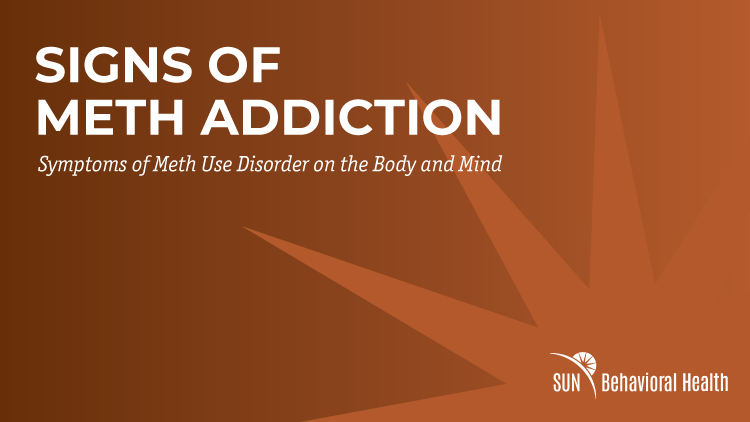Services
- Home
- Mental Health
- Who We Treat
- How We Treat
- Patients & Visitors
- About
- Lexington
close

“Is my loved one taking meth?” Between 2021 and 2022, 63,000 Kentuckians consumed methamphetamine, and many of their loved ones asked similar questions. How can you spot signs of meth addiction? If someone asked, would you be able to list them?
At SUN Behavioral Health Kentucky, we solve unmet needs by helping loved ones understand the signs of a meth use disorder. As a facility that offers crisis care and 24-hour admittance, we’ve seen our patients come in all states of need. For some, the signs of meth addiction can be more evident than others. Perhaps you have noticed changes in yourself or someone you know, but you aren’t sure what these changes mean. Today, we are going to discuss some of the most common signs of a meth use disorder you might notice in yourself or a loved one.
Meth use disorder has an impact on many aspects of someone’s life. Even if someone only takes meth for a short period or in small doses, there are several meth side effects someone might experience. Some side effects are noticeable to those around them or might seem obvious, while others may not.
When someone consumes meth, they can experience many psychological signs. Some signs are temporary and only last as long as the substance is in their system. One of these signs is euphoria. Euphoria works alongside the neurotransmitter dopamine. When someone is consuming meth, dopamine encourages them to continue to take the substance to receive the same pleasure.
In the long-term, a meth use disorder can result in the development of psychological disorders. For example, someone who has been consuming methamphetamine for several years may have developed depression. Someone else may experience psychosis and have symptoms such as paranoia, repetitive motor activity, and hallucinations.
Finally, if someone has been consuming meth for some time, they may have found that it’s difficult to stop taking the substance once started. Cravings can occur during the crash cycle of meth. During the crash period, they often feel uncomfortable and feel as if meth is the only way to relieve these feelings, causing them to want to continue.
If a loved one is consuming meth, they will often exhibit behavioral signs. For example, some people might sleep less due to the substance being a stimulant. It may also result in them feeling more focused or attentive than usual.
Others may exhibit unusual or violent behaviors. If your loved one consumes this substance, they may scratch themselves due to intense itching. Some people may become more focused on meth or have new friends who take meth. These actions may lead to them behaving secretively or suspiciously.
Some people stop attending work or school due to their meth use disorder, while other people give up recreational or social activities. Financial concerns can also begin to impact their lives because of their continued meth use.
One of the most common ways to notice if someone you love has been consuming meth is with physical signs. Some physical signs are noticeable with the naked eye, while medical tools, such as a stethoscope, may be needed to observe others.
Most of the physical symptoms someone experiences when they have consumed meth are short-term. However, there are some long-term physical signs as well. Below is a chart that includes some of the most common of both:

| Physical Signs of Meth Use Disorder | |
| Short-Term | Long-Term |
| Increased attention | Weight loss |
| Increased wakefulness | Tooth decay/Tooth loss |
| Hyperthermia | Skin Sores |
| Irregular heartbeat | Lung, liver, kidney damage |
| Decreased fatigue | Respiratory concerns |

If someone you know has a meth use disorder, it can be challenging to navigate. Your loved one may be exhibiting changes that create a sense of worry or concern. Perhaps you even feel like you’ve lost them. Or maybe you are in a place in your life where meth feels like it has taken the reins, and you aren’t confident about how you can get control back. Compassionate meth use disorder treatment can help make the process easier by providing you with the skills and support that will carry you through your recovery.
Located in Erlanger, KY, SUN Behavioral Health Kentucky solves unmet needs. One way we do this is by offering no-cost care assessments that allow you to work with a representative as they design the best treatment plan for you. Call us today at 859-429-5188 if you have any questions or wish to start treatment today.
At SUN Behavioral Health Kentucky, we solve unmet needs in the Erlanger, KY community. We do this by offering treatment for both adolescents and adults. Should you have any questions you wish to address or seek further information, please don’t hesitate to contact us at 859-429-5188.